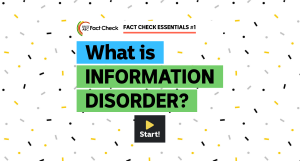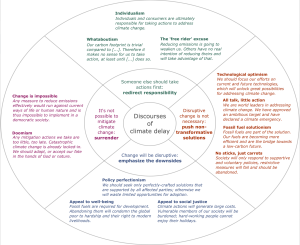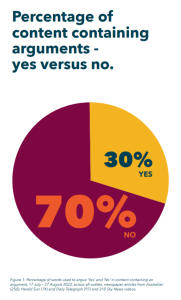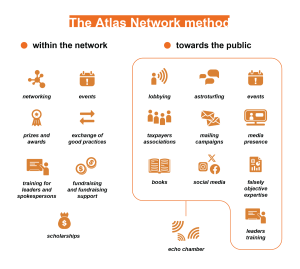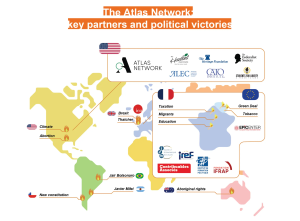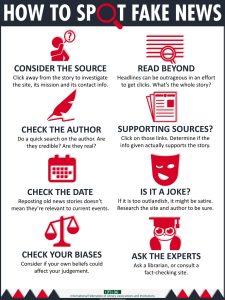To counter mis and disinformation, strategies such as prebunking and debunking are vital in the fight for climate justice. Prebunking involves educating the public about common disinformation tactics before they encounter them. In the context of climate change, this means teaching people to recognise misleading arguments that downplay the severity of climate impacts or shift blame away from the industries most responsible. Prebunking builds resilience against false information, ensuring individuals can make informed decisions based on scientific evidence and justice principles.
On the other hand, debunking is about correcting disinformation after it has spread. When false claims about climate change—such as denying human impact or overstating the economic benefits of fossil fuels—circulate, debunking provides clear, fact-based responses that directly refute these inaccuracies. This is especially important in safeguarding climate justice, as disinformation often distorts the conversation and downplays the disproportionate effects of climate change on marginalised communities.
(Source: Online Learning Quiz, ABC)
Both prebunking and debunking are essential to promoting media literacy and informing public discourse. They help combat disinformation campaigns orchestrated by media owners, political parties, and corporations that seek to protect their interests at the expense of climate action. By fostering critical thinking and promoting accurate information, these strategies empower people to advocate for equitable climate solutions, resist manipulative narratives, and uphold democratic values in the face of the climate crisis. (Source: Disinformation is rampant on social media – a social psychologist explains the tactics used against you)
Read more:
How to inoculate against climate misinformation? Prebunk it!
A news levy on big tech could save Australian journalism, 360.org
1. Climate justice, media, social media, AI and democracy
Working for climate justice requires strengthening democracy, and the media plays a crucial role in this effort. However, today’s media environment is fraught with misinformation and disinformation that spreads climate denial and undermines democratic processes and social and environmental justice. Transformative justice calls for the enhancement of democratic systems (Newell et al., 2021), which includes elements like freedom of speech, critical media, regulation of misinformation, and measures to prevent media monopolies (Who controls our media?). Community service organisations (CSOs) can support their teams and communities by improving media literacy and increasing transparency about media ownership, media monopolies, and how to differentiate between climate-conscious media and outlets that promote climate change denial (How Media, Information Sources, and Trust Shape Climate Change Denial or Doubt).
2. How is disinformation dangerous for democracy?
Think back to the last time you saw a political ad on social media that either aligned perfectly with your views or made you react strongly. Could you tell if it was from a legitimate campaign, a secretive political group, or even a foreign source? Probably not. While traditional media like TV and radio have strict rules about disclosing ad sponsors, online ads lack such transparency. Social media platforms such as Facebook, X (formerly Twitter), and Instagram, which are now major venues for political and social issues ads and discourse (official or unofficial) are difficult to regulate compared to traditional media. Thus, personal data to exploit and target specific voters, creating a situation with minimal transparency and accountability.
The Digital Threats to Democracy Dialogue summary report highlights several critical digital threats to democracy, including:
- Tackling online disinformation
- Understanding and addressing online extremism
- Foreign interference in the digital realm
- Regulation and transparency
- Digital citizenship and impacted communities
Read more:
- Unregulated online political ads pose a threat to democracy (The Conversation)
Social media, AI and democracy
AI and social media pose significant threats to democracy by amplifying disinformation, enabling targeted propaganda, and eroding public trust. AI-driven tools, such as deepfakes and algorithmic content recommendations, make it easier to manipulate public opinion, often prioritising sensationalism over factual reporting. Social media platforms, coupled with AI, can create echo chambers, polarise societies, and undermine electoral integrity by spreading false narratives at unprecedented scales. Political actors, both local and international, exploit these platforms to influence elections, spread divisive ideologies, and sway public policies. Automated bots further exacerbate these challenges by amplifying misleading content and simulating grassroots support, making it difficult to distinguish genuine discourse from manipulation. These technologies, when left unregulated, challenge democratic norms by obscuring accountability, exploiting data, and marginalising independent voices. Addressing these risks requires comprehensive regulation, transparency, and enhanced media literacy.
Effective regulation should:
- Combat Disinformation: Enforce transparency in content moderation and implement safeguards against AI-driven media manipulation. (Source: Kitware)
- Promote Accountability: Hold platforms and AI developers accountable for content amplification and misuse that threaten democratic processes. (Source: Sciences Po School of Law)
- Strengthen Integrity: Support independent media and establish norms to counteract AI-generated misinformation and election interference. (Source: Thrivability Matters)
- Empower Users: Enhance media literacy to help citizens identify manipulated content and ensure transparent algorithms and AI systems. (Source: The Guardian)
3. Understanding who is benefiting from climate denial and how it is framed
Those who benefit from climate denial typically include industries heavily reliant on fossil fuels, such as oil and gas companies, coal producers, and related businesses. These entities profit from maintaining the status quo of unrestricted carbon emissions, which allows them to continue their operations without costly regulatory compliance or shifts towards renewable energy sources. Additionally, some wealthy individuals and conservative think tanks that receive funding from these industries also benefit, as they actively promote scepticism about climate change through lobbying efforts, media campaigns, and political influence. These groups often seek to delay or prevent climate legislation that could impose restrictions on carbon emissions or incentivize clean energy initiatives, thereby protecting their financial interests in the short term despite the long-term environmental consequences.
Framing climate denial involves shaping the story and narrative about climate change scepticism by presenting it in a particular way, often influencing public perception through language, tone, and emphasis on specific aspects. This framing can impact how individuals perceive the validity of climate science and the urgency of addressing environmental issues. Climate denial can hinder progress in Climate Action, emission reduction and a just transition as it influences people’s actions and their votes in democratic elections.
Figure 1 illustrates a typology of climate delay, categorising them based on how they address four key questions related to climate action responsibility, the necessity for transformative change, the desirability of mitigation, and the feasibility of addressing climate change. The figure highlights how these discourses can redirect responsibility, promote non-transformative solutions, emphasise the downsides of climate policies, or advocate for resignation to climate change. Understanding these categories can aid in identifying and responding to these delaying tactics effectively. For further details, please refer to the original article.
(Figure 1, Source: Discourses of climate delay)
Read more:
Climate Disinformation, European Commission
Centre for Countering Digital Hate
The Denial Files – Could disinformation and denial sabotage the fight to prevent runaway climate change? (BBC Podcast)
‘Super polluters’: the top 10 publishers denying the climate crisis on Facebook (The Guardian). Note that this report is outdated.
4. Understanding media control and ownership in Australia and WA
The issue brief on the Centre for Policy Development on Media Ownership and Regulation in Australia discusses two main issues of concentrated media ownership: not enough protection for free speech, freedom of information and insufficient safeguards against potential media power abuse. The brief highlights the risks of highly concentrated media ownership, including limiting diverse opinions in the public domain, as a few entities have significant influence.
Get up! report “Who controls our Media? – Exposing the impact of media concentration on our democracy” highlights that News Corp continues to be the unchallenged dominant owner of over 59% shares of the national and metropolitan print media markets by readership.
“The 2019/20 summer bushfires fuelled a wave of public anger and frustration at the disinformation published in the Murdoch-controlled press (News Crop). Dismissal of the link between climate change and the disastrous fires led to extensive criticism of News Corp.”(Source: Get Up! Report)
Rupert Murdoch’s influence in the Climate Denial discourse in Australia was also covered by international media, such as an article in The New York Times reporting on “How Rupert Murdoch is Influencing Australia’s Bushfire Debate” and Al Jazeera reporting on “How ‘Murdochracy’ controls the climate debate in Australia”.
A dynamic and varied media sector is a crucial element of a robust democracy. Yet, in Australia, our media’s integrity and independence face ongoing challenges. For a healthy democracy, it is vital to scrutinise and regulate the currently uncontrolled media dominance and monopoly that major corporations and digital technology giants hold. In a democracy, the media plays a pivotal role as an open and free press that serves the public interest and holds power accountable. Without prompt intervention, the health of Australia’s media and democracy may face irreparable damage (Source: Get Up! report).
The documentary Outfoxed: Rupert Murdoch’s War on Journalism highlights the power dynamic and influence of Rupert Murdoch’s political and private interests of media monopolies in Australia and worldwide.
Case study:
Their interim report, “Poisoning the Debate: How the Murdoch Press is Campaigning against the Voice to Parliament – Interim Report” ” of the Murdoch Referendum Accountability Project, highlights the power of the highly concentrated media ownership of News Corp in influencing democratic processes like the voice referendum.
Murdoch Royal Commission states that the “..Murdoch monopolisation, coupled with News Corp’s increasingly radical editorial agenda, is incompatible with a healthy democracy.” You can sign their petition and join the movement here.
The Australian Communication and Media Authority provides a media interest snapshot:
Read more:
5. Understanding the impact of neoliberal Think Tanks and Networks
Neoliberal think tanks contribute to climate inaction and injustice. They aim to advance niche interests at the expense of human rights, planetary health, and democracy. They are funded by autocratic countries, rich people, oligarchs and fossil fuel corporations who are benefiting from neoliberal policies and trade.
Connections to how they have influenced democratic processes in Australia can be seen in their financial and tactical involvement against Indigenous constitutional recognition. Jeremy Walker, a senior lecturer in social and political sciences at the University of Technology Sydney in Australia, writes in his paper Silencing the Voice: the fossil-fuelled Atlas Network’s Campaign against Constitutional Recognition of Indigenous Australia:
“Coordinated across the Australian branches of the little-known Atlas Network, a global infrastructure of 500+ ‘think-tanks’ including the Centre for Independent Studies, the Institute of Public Affairs and LibertyWorks, I demonstrate that the No campaign shares the aims and methods of the longstanding Atlas disinformation campaign against climate policy. The coordinated opposition to Indigenous constitutional recognition by the Australian arm of the Atlas Network we can assume is motivated by the same intentions underlying the permanent Atlas campaign against climate policy [globally],”
The Koch Brothers, for instance, have immense influence through their ownership of Koch Industries, a sprawling conglomerate largely built on fossil fuel operations such as oil refineries and pipelines. Despite environmental violations and fines, the Kochs have directed substantial resources towards shaping political discourse and policy worldwide. They fund a network of think tanks, lobbyists, and sympathetic politicians, collectively dubbed “the Kochtopus,” aimed at thwarting regulations that could curb their profits. This ideological crusade, heavily intertwined with libertarian principles and anti-regulatory fervour, extends to obstructing climate change legislation and promoting scepticism about its existence. Their strategic funding has positioned them as pivotal figures in obstructing environmental progress, reflecting their broader agenda of advancing corporate interests under the guise of philanthropy and political advocacy.
Other ways neoliberal think tanks hurt people, the planet and democracy include:
- Eroding State or public capacity by reducing public funding; dismantling public services; transferring public assets to private ownership; disallowing government employees from giving frank and fearless advice;
- Undermining democracy by working to concentrate political authority, making peaceful protests illegal, and limiting workers’ ability to go on strike.
- Eliminating protections for workers, vulnerable populations, and the environment;
- Advance private wealth and power by removing regulations on corporations, wealthy individuals and landlords.
(Source: Multinational Observatory)
(Source: Multinational Observatory)
6. Tools to strengthen media literacy – identifying disinformation & prebunking
“Media literacy” refers to the ability of individuals to critically assess, analyse, evaluate and navigate media content effectively. It involves skills such as critical thinking, reflection, fact-checking, and analysing the influence of media in shaping attitudes.
Media literacy fosters critical thinking, awareness, responsible media production and informed citizenship.
“Intellectual self-defence” is a concept related to media competency that emphasises individuals’ ability to protect themselves from disinformation, misinformation, manipulation, and biased narratives. It involves actively seeking diverse sources of information, questioning assumptions, and developing a discerning mindset to resist undue influence from misleading media messages. Media competency and intellectual self-defence empower individuals to engage with information thoughtfully and make well-informed decisions in the face of a complex media landscape.
Disinformation and misinformation
- misinformation (wrong information spread by mistake),
- disinformation (false information spread on purpose to deceive),
- misleading information (information that includes only elements of truth but does not represent the full truth to mislead people. This is done by leaving details out, exaggerating things, or misrepresenting the overall context to change how people think about a topic)
- conspiracy theories (unfounded explanations involving secret, harmful actions)
Forms of disinformation
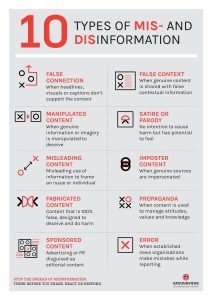 (Source: Groundview, 2018)
(Source: Groundview, 2018)
Identifying disinformation and misinformation
(Source: Cornell University Library)
Using fact checker
To verify if the information and articles you are reading are correct or misleading, you can, for instance, the Civic Online Reasoning resources, which provide training and information to help better understand information, author and intentions, including: Who’s behind the information? What’s the evidence? What do other sources say? Who’s behind the information?
Furthermore, you can check what reliable sources are saying to inform yourself about the owner of the media source and their political and ideological agenda.
Use the Media Bias/Fact Checker to find out about the ownership and the credibility rate of the media you are using.
Further tools to fact-check your media sources:
Read more:
When Facts Fail: How We Fight Misinformation (The Commons Social Change Library)
Prebunking: future-proofing democracy
Prebunking is a method used to stop online manipulation before it starts. It works by warning people ahead of time and teaching them how to identify and challenge false information. This makes them less likely to be tricked in the future.
Prebunking is important for democracy because it helps protect the integrity of public discourse. By teaching people to recognise and counter false information, it ensures that voters make decisions based on accurate and reliable facts. This leads to more informed voting, healthier political debates, and, ultimately, a stronger democratic process. It seeks to foster resilience against disinformation, raise awareness about the tactics and stories used to spread false information and prevent people from believing and spreading false information.
Resources:
- Protect your democracy provides a variety of resources to support pre-bunking:
- Protect Against Manipulation
- Protect Access to Information
- Protect Access to the Free & Open Web
- Protect Personal Accounts
- Protect Online Conversation
- Prebunking Manipulation Techniques: Ad Hominem Attacks
- Prebunking Manipulation Techniques: Scapegoating
- Prebunking Manipulation Techniques: False Dichotomies
- Prebunking Manipulation Techniques: Incoherence
- Prebunking Manipulation Techniques: Emotional Language
